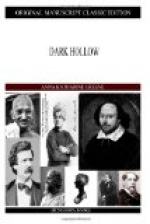“You see that it was no fault of my own I was trying to hide,” she finally remarked in her rich and sympathetic voice.
“Put back your veil.”
It was all he said.
Trembling she complied, murmuring as she fumbled with its folds:
“Disgrace to an Ostrander! I know that I was mad to risk it for a moment. Forgive me for the attempt, and listen to my errand. Oliver was willing to marry my child, even after he knew the shame it would entail. But Reuther would not accept the sacrifice. When she learned, as she was obliged to now, that her father had not only been sentenced to death for the worst crime in the calendar, but had suffered the full penalty, leaving only a legacy of eternal disgrace to his wife and innocent child, she showed a spirit becoming a better parentage. In his presence, and in spite of his dissuasions (for he acted with all the nobility one might expect) she took off her veil with her own hands and laid it aside with a look expressive of eternal renunciation. She loves him, sir; and there is no selfishness in her heart and never has been. For all her frail appearance and the mildness of her temper, she is like flint where principle is involved or the welfare of those she loves is at stake. My daughter may die from shock or shame, but she will never cloud your son’s prospects with the obloquy which has settled over her own. Judge Ostrander, I am not worthy of such a child, but such she is. If John—”
“We will not speak his name,” broke in Judge Ostrander, assuming a peremptory bearing quite unlike his former one of dignified reserve. “I should like to hear, instead, your explanation of how my son became inveigled into an engagement of which you, if no one else, knew the preposterous nature.”
“Judge Ostrander, you do right to blame me. I should never have given my consent, never. But I thought our past so completely hidden—our identity so entirely lost under the accepted name of Averill.”
“You thought!” He towered over her in his anger. He looked and acted as in the old days, when witnesses cowered under his eye and voice. “Say that you knew, madam; that you planned this unholy trap for my son. You had a pretty daughter, and you saw to it that she came under his notice; nay, more, ignoring the claims of decency, you allowed the folly to proceed, if you did not help it on in your misguided ambition to marry your daughter well.”
“Judge Ostrander, I did not plan their meeting, nor did I at first encourage his addresses. Not till I saw the extent of their mutual attachment, did I yield to the event and accept the consequences. But I was wrong, wholly wrong to allow him to visit her a second time; but now that the mischief is done—”
Judge Ostrander was not listening.
“I have a question to put you,” said he, when he realised that she had ceased speaking. “Oliver was never a fool. When he was told who your daughter was, what did he say of the coincidence which made him the lover of the woman against whose father, his father had uttered a sentence of death? Didn’t he marvel and call it extraordinary—the work of the devil?”




